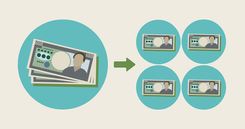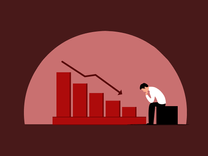Inflation is an economic phenomenon caused by rising prices of goods and services. It can significantly affect a person's budget, as income must be adjusted to maintain the standard of living. This means that those on a fixed salary may face difficulties in adjusting their budget to compensate for rising prices.
As prices rise, people must readjust their budgets to compensate for the increase. This means they will have to spend less on some things to ensure they can afford to pay for others. In the long run, this can have a negative impact on a person's standard of living, as they will have to cut back on expenses to compensate for inflation.
In addition, it is important to keep in mind the cumulative effect of inflation. If there is a sustained increase in prices, this could force people to cut back on their spending more and more in order to keep up with the cost of living. Flexing one's budget and looking for creative ways to save money is crucial to cope with the negative impact of inflation on one's pocketbook.
What is inflation?
Inflation is a widespread and sustained increase in the prices of goods and services in an economy. It is a measure of how much average prices rise over time. This means that the higher the inflation, the lower the purchasing power of the currency. This is reflected in a higher cost to purchase the same goods and services.
The impact of inflation on your budget depends mainly on the percentage increase. The higher the inflation, the more expensive the products and services you need to live. This means that you will have to spend more of your income to cover your basic expenses, reducing the money you have left for other things.
Causes of inflation
The causes of inflation are numerous. The main cause is excessive demand, which increases prices and reduces supply. Rising oil prices can also contribute to inflation, as production costs for many goods will increase. Excessive money printing can also contribute to inflation, as this causes a devaluation of the currency relative to other goods.
Inflation can also result from a growing economy. When a country's gross domestic product (GDP) increases, this can mean that there is greater demand for goods and services. This, in turn, can increase prices and cause prices to rise across the board. Government policies can also influence the level of inflation; for example, high taxes or excessive regulations can make products and services more expensive.
How inflation affects household budgets
Inflation directly affects household budgets, as it reduces the purchasing power of the currency. Therefore, there is an increase in the price of goods and services, which means that more money is needed to buy the same products. This means that household budgets have to be revised and increased to accommodate inflation and meet family needs.
Strategies for Coping with Inflation
Inflation coping strategies are key to maintaining a balanced budget. One important way to combat inflation is to save. This helps prevent money from being absorbed by higher prices. It is possible to save a few hundred dollars each month by tracking daily expenses and finding areas where spending can be reduced.
A second way to deal with inflation is to look for opportunities to invest. The ability to earn a steady stream of income in the form of interest, dividends or profits is a solid way to combat the adverse effects of rising prices. Business owners can also look for opportunities to expand their operations, implement new technologies and improve their productivity.
Conclusion
In conclusion, inflation can significantly affect your budget. Therefore, it is important to stay on top of prices and prepare for increases. This will help you keep up with the latest trends and allow you to control your expenses in the face of the effects of inflation.












